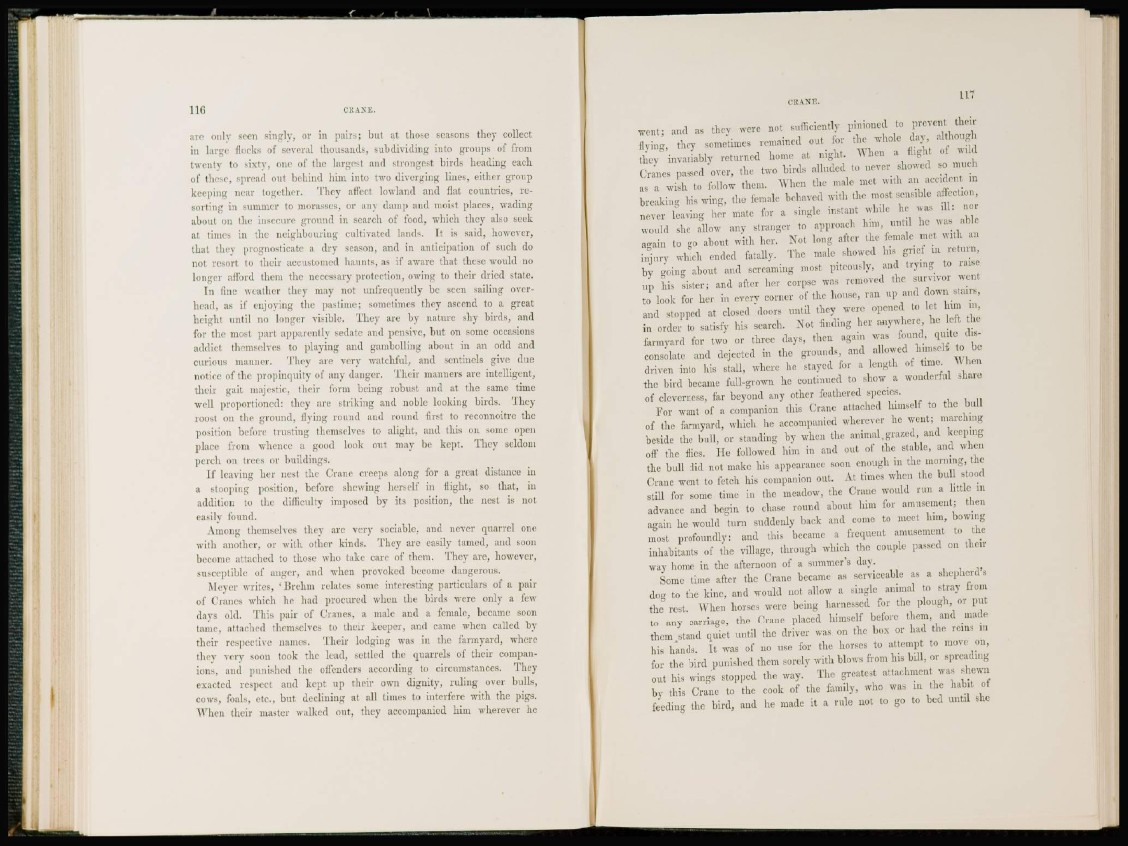
i n ; CRANE.
are only seen singly, or in pairs; but al those seasons they collect
in large flocks of several thousands, subdividing into groups of from
twenty to sixty, one of the largest and strongest birds beading each
of these, spread out behind him into two diverging lines, either group
keeping near together. They affect lowland and flat countries, resorting
in summer to morasses, or any damp and moist places, wading
about on the insecure ground in search of food, which they also seek
at. times in the neighbouring cultivated lands. It is said, however,
that they prognosticate a dry season, and in anticipation of such do
not resort to their accustomed haunts, as if aware that these would no
longer afford them the necessary protection, owing to their dried stale.
In fine weather they may not unfrcqucntly be seen sailing overhead,
as if enjoying the pastime; sometimes they ascend to a great
height until no Longer visible. They are by nature shy birds, and
for the most pail apparently sedate and pensive, but on seme occasions
addict themselves to playing and gambolling about in an odd and
curious manner. They are very watchful, and sentinels give due
notice of the propinquity of any danger. Their manners arc intelligent,
their gait majestic, their form being robust and at the same time
well proportioned: they are striking and noble looking birds. They
roost on the ground, Hying round and round first to reconnoitre the
position before trusting themselves to alight, and this on some open
place from whence a good look out may be kept. They seldom
perch on trees or buildings.
If leaving her nest the Crane creeps along for a great distance in
a stooping position, before shewing herself in flight, so that, in
addition to the difficulty imposed by its position, the nest is not
easily found.
Among themselves they are very sociable, and never quarrel one
with another, or with other kinds. They arc easily tamed, and soon
become attached to those who take care of them. They are, however,
susceptible of anger, and when provoked become dangerous.
Mover writes, ' Brchm relates some interesting particulars of a pair
of Cranes which he had procured when the birds were only a few
days old. This pair of Cranes, a male and a female, became soon
tame, attached themselves to their keeper, and came when called by
their respective names. Their lodging was in the farmyard, where
they very soon took the lead, settled the quarrels of their companions,
and punished the offenders according to circumstances. They
exacted respect and kept up their own dignity, ruling over bulls,
cows, foals, etc., but. declining at all times to interfere with the pigs.
When their master walked out, they accompanied him wherever he
went; and as they were not sufficiently pinioned to prevent their
flying, they sometimes remained out for the whole day, although
they invariably returned home at night. When a flight of wild
Cranes passed over, the two birds alluded to never showed so much
as a wish to follow them. When the male met with an accident in
breaking his wing, the female behaved with the most sensible affection,
never leaving her mate for a single instant while he was ill: nor
would she allow any stranger to approach him, until he was able
again to go about with her. Not long after the female met with an
injury which ended fatally. The male showed his grief in return,
by going about and screaming most piteously, and trying to raise
up his sister; and after her corpse was removed the survivor went
to look for her in every corner of the house, ran up and down stairs,
and stopped at closed doors until they were opened to let him in,
in order to satisfy his search. Not finding her anywhere, he left the
farmyard for two or three days, then again was found, quite disconsolate
and dejected in the grounds, and allowed himself to be
driven into his stall, where he staved for a length of time. When
the bird became full-grown he continued to show a wonderful share
of cleverness, far beyond any other feathered species.
For want of a companion this Crane attached himself to the bull
of the farmyard, which he accompanied wherever he went; marching
beside the bull, or standing by when the animal,grazed, and keeping
off the flics. He followed him in and out of the stable, and when
the bull did not make his appearance soon enough in the morning, the
Crane went to fetch his companion out. At times when the bull stood
still for some time in the meadow, the Crane would run a little in
advance and begin to chase round about him for amusement; then
again he would turn suddenly back and come to meet him, bowing
most profoundly: and this became a frequent amusement to the
inhabitants of the village, through which the couple passed on their
way home in the afternoon of a summer's day.
Some time after the Crane became as serviceable as a shepherd's
dog to the kine, and would not allow a single animal to stray from
the rest. When horses were being harnessed for the plough, or put
to any carriage, the Crane placed himself before them, and made
them tstand quiet until the driver was on the box or had the reins in
his hands. It was of uo use for the horses to attempt to move on,
for the bird punished them sorelv with blows from his bill, or spreading
out his wings stopped the way. The greatest attachment was shewn
by this Crane to the cook of the family, who was in the habit of
feeding the bird, and he made it a rule not to go to bed until she